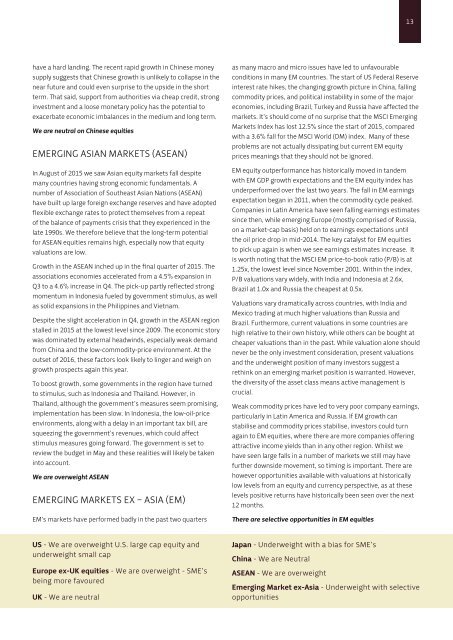You also want an ePaper? Increase the reach of your titles
YUMPU automatically turns print PDFs into web optimized ePapers that Google loves.
13<br />
have a hard landing. The recent rapid growth in Chinese money<br />
supply suggests that Chinese growth is unlikely to collapse in the<br />
near future and could even surprise to the upside in the short<br />
term. That said, support from authorities via cheap credit, strong<br />
investment and a loose monetary policy has the potential to<br />
exacerbate economic imbalances in the medium and long term.<br />
We are neutral on Chinese equities<br />
EMERGING ASIAN MARKETS (ASEAN)<br />
In August of 2015 we saw Asian equity markets fall despite<br />
many countries having strong economic fundamentals. A<br />
number of Association of Southeast Asian Nations (ASEAN)<br />
have built up large foreign exchange reserves and have adopted<br />
flexible exchange rates to protect themselves from a repeat<br />
of the balance of payments crisis that they experienced in the<br />
late 1990s. We therefore believe that the long-term potential<br />
for ASEAN equities remains high, especially now that equity<br />
valuations are low.<br />
Growth in the ASEAN inched up in the final quarter of 2015. The<br />
associations economies accelerated from a 4.5% expansion in<br />
Q3 to a 4.6% increase in Q4. The pick-up partly reflected strong<br />
momentum in Indonesia fueled by government stimulus, as well<br />
as solid expansions in the Philippines and Vietnam.<br />
Despite the slight acceleration in Q4, growth in the ASEAN region<br />
stalled in 2015 at the lowest level since 2009. The economic story<br />
was dominated by external headwinds, especially weak demand<br />
from China and the low-commodity-price environment. At the<br />
outset of <strong>2016</strong>, these factors look likely to linger and weigh on<br />
growth prospects again this year.<br />
To boost growth, some governments in the region have turned<br />
to stimulus, such as Indonesia and Thailand. However, in<br />
Thailand, although the government’s measures seem promising,<br />
implementation has been slow. In Indonesia, the low-oil-price<br />
environments, along with a delay in an important tax bill, are<br />
squeezing the government’s revenues, which could affect<br />
stimulus measures going forward. The government is set to<br />
review the budget in May and these realities will likely be taken<br />
into account.<br />
We are overweight ASEAN<br />
EMERGING MARKETS EX – ASIA (EM)<br />
EM’s markets have performed badly in the past two quarters<br />
as many macro and micro issues have led to unfavourable<br />
conditions in many EM countries. The start of US Federal Reserve<br />
interest rate hikes, the changing growth picture in China, falling<br />
commodity prices, and political instability in some of the major<br />
economies, including Brazil, Turkey and Russia have affected the<br />
markets. It’s should come of no surprise that the MSCI Emerging<br />
Markets Index has lost 12.5% since the start of 2015, compared<br />
with a 3.6% fall for the MSCI World (DM) index. Many of these<br />
problems are not actually dissipating but current EM equity<br />
prices meanings that they should not be ignored.<br />
EM equity outperformance has historically moved in tandem<br />
with EM GDP growth expectations and the EM equity index has<br />
underperformed over the last two years. The fall in EM earnings<br />
expectation began in 2011, when the commodity cycle peaked.<br />
Companies in Latin America have seen falling earnings estimates<br />
since then, while emerging Europe (mostly comprised of Russia,<br />
on a market-cap basis) held on to earnings expectations until<br />
the oil price drop in mid-2014. The key catalyst for EM equities<br />
to pick up again is when we see earnings estimates increase. It<br />
is worth noting that the MSCI EM price-to-book ratio (P/B) is at<br />
1.25x, the lowest level since November 2001. Within the index,<br />
P/B valuations vary widely, with India and Indonesia at 2.6x,<br />
Brazil at 1.0x and Russia the cheapest at 0.5x.<br />
Valuations vary dramatically across countries, with India and<br />
Mexico trading at much higher valuations than Russia and<br />
Brazil. Furthermore, current valuations in some countries are<br />
high relative to their own history, while others can be bought at<br />
cheaper valuations than in the past. While valuation alone should<br />
never be the only investment consideration, present valuations<br />
and the underweight position of many investors suggest a<br />
rethink on an emerging market position is warranted. However,<br />
the diversity of the asset class means active management is<br />
crucial.<br />
Weak commodity prices have led to very poor company earnings,<br />
particularly in Latin America and Russia. If EM growth can<br />
stabilise and commodity prices stabilise, investors could turn<br />
again to EM equities, where there are more companies offering<br />
attractive income yields than in any other region. Whilst we<br />
have seen large falls in a number of markets we still may have<br />
further downside movement, so timing is important. There are<br />
however opportunities available with valuations at historically<br />
low levels from an equity and currency perspective, as at these<br />
levels positive returns have historically been seen over the next<br />
12 months.<br />
There are selective opportunities in EM equities<br />
US - We are overweight U.S. large cap equity and<br />
underweight small cap<br />
Europe ex-UK equities - We are overweight - SME’s<br />
being more favoured<br />
UK - We are neutral<br />
Japan - Underweight with a bias for SME’s<br />
China - We are Neutral<br />
ASEAN - We are overweight<br />
Emerging Market ex-Asia - Underweight with selective<br />
opportunities


